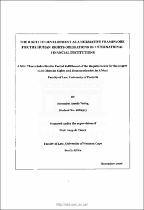The right to development as a normative framework For the human rights obligations of international financial institutions
Abstract
Human rights are the product of different stages of human struggle that took place throughout history. The advent of the right to development in the international arena is part of the result of the struggle of developing countries for a New International Economic Order (NIE0).1 The right to <!development belongs to the group of third generation rights which includes the right to healthy environment, and the right to peace.2 According to the proponents of third generation rights all actors in the social scene: the state, the individual, public and private firms and the entire international community need to have a concerted action for the realization of these rights.3 -Supporters of third generation rights also stress the danger that globalization poses on existing human rights structures rendering individual states, acting alone unable to satisfy the obligations imposed by international human rights instruments Since the idea of a 'Right to Development' (RTD) was coined by the Senegalese jurist Keba M'baye in 1972 the subject remains the focus of human rights and development literature. Legal scholars from the south articulated the notion and enumerated the possible subjects and objects of this right, while jurists from the north questioned whether such right existed at all.

